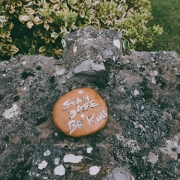Building back better – make 2021 a
Year of Empathy
 The end of 2020 was a relief for many of us, but here we are in 2021 facing many of the same challenges, with the world seeming in many ways a more difficult place despite the roll out of the vaccine.
The end of 2020 was a relief for many of us, but here we are in 2021 facing many of the same challenges, with the world seeming in many ways a more difficult place despite the roll out of the vaccine.
Many people are really struggling with the current conditions. Back in the early summer, a UCL study reported that a fifth of vulnerable people had considered self-harm or suicide. This was really brought home to me recently with a personal experience of knowing someone firsthand who sadly became a victim of this struggle a few weeks ago.
It made me dwell and contemplate on what’s important in life during this awful lockdown. How can we support each other better and build a more caring world within the confines in which we find ourselves in? How can we really listen and understand what people are saying? What is really going on in the heads of people when we don’t have the ability to read their faces and gain eye contact and share informal time and conversation?
The irony of Covid-19 is that it is intensely personal, as it has affected all our lives, but at the same time the response seems intensely impersonal, as it applies blanket rules and conditions that are not nuanced to personal circumstances.
In so many ways 2020 was a brutal year for mental health and well-being. The phrase ‘be kind’ was much touted but has often seemed hollow. Empathy has been in short supply and the government and press have increased the pressure on people and increased conflict through endless clickbait of blame, sensationalism and doom. Social media also encourages angry knee jerk responses that lead to conflict and a lack of compassion.
The irony of Covid-19 is that it is intensely personal, as it has affected all our lives, but at the same time the response seems intensely impersonal, as it applies blanket rules and conditions that are not nuanced to personal circumstances. Not being able to comfort one another and grieve properly is so cruel.
Brexit discussions are also a good illustration of the economic and personal rules Vs the personal impact. The government and press focus has all been on the blanket economic and trade implications of a deal, without considering the personal and emotional devastation it has wrought for so many people whose lives and families have been turned upside down due to the end of freedom of movement.
We need to think much more broadly about the breadth of the economy and what the economy must look like for the future. Scaling and globalisation need to be looked at through a fundamentally different lens.
Emotional impact is collateral damage that is not a valid discussion in a world that is obsessed with measuring and evidencing ‘things’ – and government policy follows this pattern. There is a divorce of emotional impact from the economic arguments, as if somehow the economy is not the result of the actions of inherently emotional beings (i.e. us!)
I would argue that we have to start seeing the two together with equal weighting, which is where social enterprises excel. Really listening and responding to the needs of those stakeholders and the challenges facing them goes back to the heritage of our movement – e.g. the cooperative model, which allows for people to support one another alongside creating wealth for the collective good. We as social enterprises need to be more conscious of getting better at working together too.
At the heart of our economy are human beings who are all being affected by the unprecedented challenges that we face currently and to ignore this will not lead us to Building Back Better – just a more divided incoherent society that cannot address the challenges of climate change and social polarisation.
It saddens me to see that the government have put together a Build Back Better Council that comprises all the same old faces of big corporations and businesses – where is the human side of that? We need to think much more broadly about the breadth of the economy and what the economy must look like for the future. Scaling and globalisation need to be looked at through a fundamentally different lens.
 As individuals we can each play our part too. My colleague and friend Ed Mayo (formerly of Co-operatives UK and currently CEO of Pilotlight), has recently called for 2021 to be a Year of Empathy. He recommends the following actions:
As individuals we can each play our part too. My colleague and friend Ed Mayo (formerly of Co-operatives UK and currently CEO of Pilotlight), has recently called for 2021 to be a Year of Empathy. He recommends the following actions:
- Cultivate your curiosity – choose novels, newspapers or networks that talk to different realities than your own.
- Listen actively – ask open questions, hold back on judgement, share what you learn.
- Try a dialogue and not just a conversation – where the purpose of talking is not necessarily to reach agreement but rather to understand each other, including the differences and dissonances (‘dialogic communication’).
- Express your empathy – as a feeling, empathy spreads when it is visible, a phenomenon seen early when infant children cry when others do the same (the ‘chameleon effect’).
- Be generous, not just in a spontaneous, but in an organised, regular way, so that it becomes part of who you are.
I would also add:
- Try to analyse and be aware of your emotional impact – how is what you are saying impacting someone else, why are they responding in the way that they are? Be aware that people may have a lot of stress going on in their lives that might not be evident.
- Ask how someone is and really listen – if you are not feeling good, say so! It’s good to share.
In a Year of Empathy we need to get much better at hearing and responding, but we also need to think in a much more joined up way. At the heart of our economy are human beings who are all being affected by the unprecedented challenges that we face currently and to ignore this will not lead us to Building Back Better – just a more divided incoherent society that cannot address the challenges of climate change and social polarisation.
Social enterprises and their wider social economy family are doing a great job, but we need to be even better, and we desperately need amplification through allies and new converts to seeing the world through a joined up social, empathetic, environmental and economic lens.
Year of Empathy





